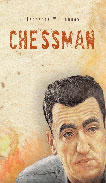"Chessman smiled and held his two arms over his head, hands clenched like a boxing champion, instead of the reprieve champion he was. 'Sixty days, boys. The governor gave me a sixty day reprieve.'"

 |
Chessman by Terrence W. Cooney Trafford Publishing
book review by Linda Mae Wolter
The events in this book took place in 1960, and the author recounts them in great detail. The actual crimes Chessman was convicted of committing are not recounted, but instead the author concentrates on the politics of the death sentence. The story is an almost true account but was written as a novel because, though much of the material is from actual trial transcripts and histories of Caryl Chessman's life, some dialogue and events were fictionalized. Cooney fills the story with authentic sounding conversations regarding politics, verdicts, rulings, and colorful episodes of Chessman's life.
Chessman himself wrote three biographies, and also one work of fiction, The Kid Was a Killer. His books sold well and were translated into eighteen languages It was alleged that his books sold well only because they had the cachet of being "written by a man condemned to death."
Smart enough (or arguably, dumb enough) Chessman insisted on acting as his own attorney. Navigating the legal system is difficult for even an experienced lawyer, and Chessman certainly was not that. Many felt that Chessman was executed mostly because he gambled and lost when he didn't plea bargain for a lesser sentence.
Rosalie Asher, a Sacramento County law librarian and also an attorney was featured heavily in this book. To no avail, she worked tirelessly for many years to get Chessman off death row. Caryl Chessman was executed on May 2, 1960 by the State of California, on the ninth attempt. Eight previous execution dates were all stayed.
This book concentrates on the politics of Chessman's death sentence and seems overfilled with descriptions of clothing and landscapes. There is little information regarding the actual crimes Chessman committed. The fictionalized accounts of the conversations depicted between the prosecutors and the lawyers trying to help Chessman ring very true.